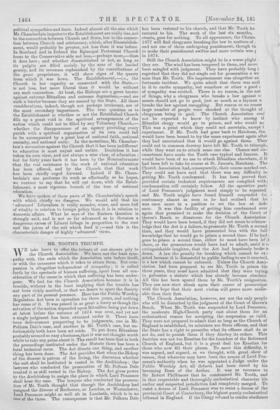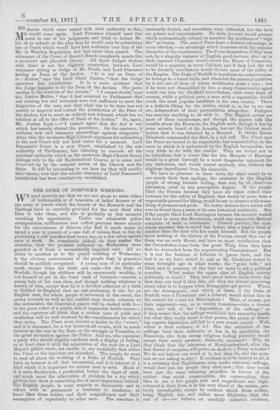MR. TOOTH'S TRIUMPH.
WE take leave to offer the tribute of our sincere pity to the Church Association. We have not the least sym- pathy with the ends which the Association sets before itself, • or with the measures which it takes to attain them. But com- passion is altogether independent of sympathy ; it is called forth by the spectacle of human suffering, apart from all con- sideration of the cause in which that suffering has been under- gone. We feel for the Church Association because it is in trouble, -without in the least implying that the trouble has mot been richly merited, or that we desire to spare the Society any part of its present penance. Here has the Public Worship Regulation Act been in operation for three years, and nothing has come of it. It was passed in as great a hurry as though the salvation of the nation depended upon Ritualism being put down at latest before the autumn of 1874 was over, and yet not • a single judgment has been obtained under it. There have been deliverances purporting to be judgments, one in Mr. Pelham Dale's case, and another in Mr. Tooth's case, but un- fortunately both have been set aside. To put down Ritualism probably seemed so easy a business,that it was not thought worth while to take any pains about it. The result has been that in both the proceedings instituted under the Statute there has been a fatal technical error. The Act directs one thing, and another thing has been done. The Act provides that when the Bishop of the diocese is patron of the living, the discretion whether the suit shall be instituted is vested in the Archbishop ; the lawyers who conducted the prosecution of Mr. Pelham Dale treated it as still vested in the Bishop. The Act gives power to the Archbishop to assign the place in which Lord Penzance shall hear the ease. The lawyers who conducted the prosecu- tion of Mr. Tooth thought that though the Archbishop had assigned the diocese of Rochester, or London, or Westminster, Lord Penzance might as well sit in Lambeth, which is in no One of the three. The consequence is that Mr. Pelham Dale has been restored to his church, and that Mr. Tooth ha restored to his. The work of the last six months, events, goes for nothing. To all appearance, the Christi 1877 will find clergymen breaking the law in matters of . and not one of them undergoing punishment, though th to make their punishment swifter and more certain was / in 1874.
Still the Church Association might be in a worse plight , they are. The wind has been tempered to them, and mere, been mingled with judgment. They have probably long E regretted that they did not single out for prosecution a we man than Mr. Tooth. His imprisonment was altogether an fortunate incident. We quite admit that there was notl in it to excite sympathy, but somehow or other a good c of sympathy was excited. There is no reason, in the nat of things, why a clergyman who breaks a law against vi ments should not go to gaol, just as much as a layman w breaks the law against smuggling. But reason or no reasor large number of people were shocked at the thought of clergyman being in gaol. The Church Association coul not be expected to know by instinct who among tl Ritualist clergy would go to prison, and who would nc This was a point which they could not ascertain, except 1. experiment. If Mr. Tooth had gone back to Hatcham, the would have been bound to try the same experiment again aftei they had ascertained that it would go against them. They could not in common decency have left Mr. Tooth to triumph, while they went on to attack some one else. Chance and cir- cumstance have made the Tooth case typical and famous. It would have been of no use to attack Ritualism elsewhere, if it had been left to take its course at St. James's, Hatcham. The Church Association had, consequently, their course marked out. They could not have said that there was any difficulty in getting Mr. Tooth condemned. It has been proved that, provided certain technical requirements are complied with condemnation will certainly follow. All the operative part of Lord Penzance's judgment need simply to be repeated , and Mr. Tooth might have found himself suspended fo3 ,• contumacy almost as soon as he had realised that he was once more in a position to set the law at defi- ance. It was this facility of getting him condemned over . again that promised to make the decision of the Court of L' Queen's Bench so disastrous for the Church Association . They would have been bound, if they did not mean to acknow. „ ledge that the Act is a failure, to prosecute Mr. Tooth a second I time, and they would have prosecuted him with the full ! knowledge that he would go to prison a second time. If he had . gone to prison a second time, either he must have been lef (t there, or the prosecutors would have had to admit, amid it t- extinguishable laughter, that the Act had hopelessly broke n down. A law the penalty for breaking which cannot be ex.- acted because it is distasteful to public feeling to see it exacter,l, is a law which cannot be enforced. Unless the Church Ass - ciation had been prepared to see Mr. Tooth in prison fd,r three years, they must have admitted that they were trying to galvanise a statute which has already become obsolete. All this has been spared them by Mr. Tooth's resignation. They can now start afresh upon their career of prosecution with the hope that their next victim will prove more malle- able than their first.
The Church Association, however, are not the only people who will be disturbed by the judgment of the Court of Queen's Bench. When Mr. Tooth was suspended by Lord Penzance, the moderate High-Church party cast about them for an ecclesiastical reason for accepting the suspension as valid. They were not prepared to admit that so long as the Church of England is established, its ministers are State officers, and that the State has a right to prescribe what its officers shall do or not do, and to punish them if they disobey its orders. This doctrine was not too Erastian for the founders of the Reformed Church of England, but it is a, great deal too Erastian for those who now fill their places. To meet this difficulty, it was argued, and argued, as we thought, with great show of reason, that whatever may have been the source of Lord Pen- zance's authority when he , was appointed a Judge under the Public Worship Act, all defects had been cured by his becoming Dean of the Arches. It was as successor to Sir Robert Phillimore that he condemned Mr. Tooth, and in that respectable and thoroughly ecclesiastical character his earlier and suspected jurisdiction had completely merged. To resist a decree of Lord Penzance was to resist a decree of the provincial Court of Canterbury, the highest purely ecclesiastical tribunal in England. If the Clergy refused to render obedience
ment in one of his judgments, and tried to induce Mr. his eh to submit on the plea that he would only be submitting has le Court which would have had authority over him if the Mr. tic Worship Regulation Act had never been passed. The advament of the Court of Queen's Bench completely upsets this a nvenient and plausible theory. All three Judges declare whit there is not the slightest connection between Lord waezance sitting as Judge of Mr. Tooth, and Lord Penzance keeling as Dean of the Arches. "It is not as Dean of to Arches," says the Lord Chief Justice, "that the Judge
spercises this jurisdiction. It is a mere accident that toe Judge happens to be the Dean of the Arches. The juris- cacti= is the creation of the statute." "I cannot doubt," says tics. Justice Mellor, "that it had occurred to Parliament that eae existing law and tribunals were not sufficient to meet the firigencies of the case, and that what was to be done was not :merely to improve and extend the jurisdiction of the Dean of the Arches, but to erect an entirely new tribunal, which has no kelation at all to the office of Dean of the Arches." So, again, 'Mr. Justice Lush :-44 I cannot agree that the Act is one which has merely altered the procedure. On the contrary, it initiates new and summary proceedings against clergymen." After this, the moderate High-Church argument for submitting to the new Court will not hold water for a moment. Lord Penzance's Court is a new Court,. established by the sole authority of Parliament, but claiming to execute all the spiritual authority which on the moderate High-Church theory belongs only to the old Ecclesiastical Courts, or to some new Court set up by the conjoint action of the Church and the State. It will be interesting to see how far they will modify their theory, now that the secular character of Lord Penzance's jurisdiction has been conclusively established.







































 Previous page
Previous page